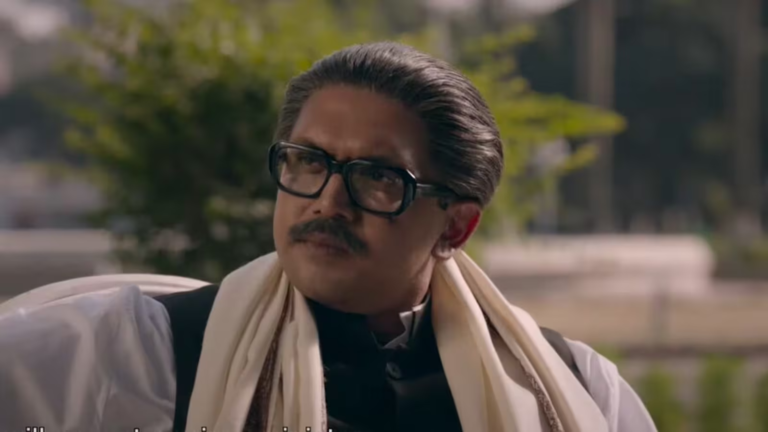Director: Shyam Benegal
Writers: Atul Tiwari, Shama Zaidi
Cast: Arifin Shuvoo, Nusrat Imrose Tisha, Nusraat Faria, Tauquir Ahmed, Riaz, Shahidul Alam Sachchu
Duration: 178 mins
Now Showing at: Cinemas
When a legendary filmmaker’s work falls short, the disappointment is profound, particularly when the director is an icon who shapes cultural narratives. Reviewing a film that fails to even meet the fundamental benchmarks of filmmaking is a difficult task, but the film “Mujib: The Making of a Nation” compels this honesty. This 178-minute biopic on Sheikh Mujibur Rahman, revered as the father of Bangladesh, sadly plays out like a disconnected patchwork of events rather than a cohesive story.
Produced by the NFDC (National Film Development Corporation of India) and BFDC (Bangladesh Film Development Corporation), the film seems to trivialize Mujib’s life into a linear, oversimplified portrayal of historical events. Instead of offering a fresh perspective, the film often feels like a cursory Internet search brought to life. Key moments from Mujib’s life – his early political activism, gradual rise in politics, the struggle for his country’s independence, and his presidency – are narrated superficially, devoid of depth and coherence.
Shyam Benegal’s “Mujib” faces an uphill battle in its narrative execution. The film is marred by numerous flaws such as awkward transitions, inconsistent storytelling, and anachronisms. There’s a noticeable lack of detail and authenticity in its portrayal, detracting significantly from the potential impact of Mujib’s story. For instance, timelines jump erratically with little explanation, historical inaccuracies are glaring, and even minor details like age discrepancies and poorly crafted set pieces are jarringly evident.
Benegal’s latest venture is a far cry from his acclaimed works, lacking not just in technical finesse but also in narrative substance. The film’s attempt at war sequences and expansive backgrounds falls flat due to underwhelming visual effects. Key historical moments and dramatic scenes are presented with a lack of refinement, lessening their intended effect.
Even the performances, including that of lead actor Arifin Shuvoo, struggle under the weight of the film’s overall execution. Limited by a script that often feels disconnected and a dubbing that adds another layer of disconnect, the cast’s efforts are unable to salvage the storytelling. A rare moment of narrative potential quickly fizzles out, overshadowed by the film’s larger shortcomings.
The movie’s concluding act, portraying a tragic event, is handled in a manner that raises questions more about its intent rather than its artistic value. In an age when Bangladeshi cinema is carving its niche internationally, it’s disheartening that such a significant biopic, especially one produced in collaboration with India, fails to capture the essence and importance of its subject. “Mujib: The Making of a Nation,” unfortunately, remains a project where its ambition surpasses its execution, leaving much to be desired in honoring the legacy of Sheikh Mujibur Rahman.


